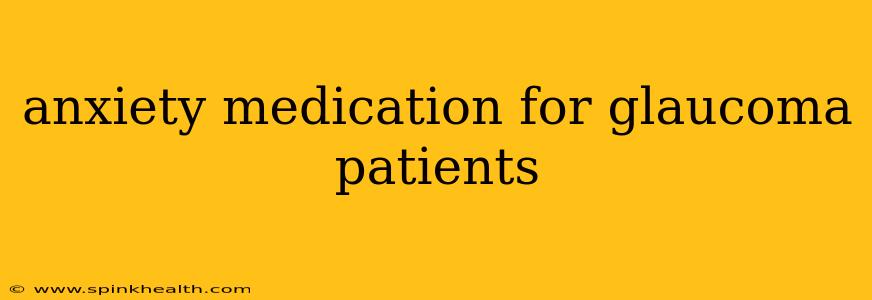Glaucoma, a sneaky thief of sight, and anxiety, a pervasive shadow of modern life, can sometimes coexist, creating a complex challenge for patients. The pressure of managing a chronic illness like glaucoma, coupled with the ever-present worry about potential vision loss, can easily trigger or exacerbate anxiety. This creates a critical need for careful consideration when choosing anxiety medication, ensuring it doesn't negatively impact glaucoma treatment. Let's unravel the intricacies of this delicate balance.
What are the common anxiety medications?
The landscape of anxiety medication is broad, encompassing various classes of drugs, each with its own mechanism of action and potential side effects. Commonly prescribed medications include selective serotonin reuptake inhibitors (SSRIs), serotonin-norepinephrine reuptake inhibitors (SNRIs), benzodiazepines, and buspirone. Each type interacts differently with the body, and some can have a more significant impact on eye health than others.
Can anxiety medication affect glaucoma?
This is the million-dollar question. The answer isn't a simple yes or no. Some anxiety medications might not directly affect glaucoma, while others could potentially worsen the condition or interact negatively with glaucoma medications. The key lies in understanding the specific medication and its potential side effects. For example, certain medications may affect intraocular pressure (IOP), a critical factor in glaucoma management.
Which anxiety medications are safe for glaucoma patients?
This is not something to self-determine. It's crucial to discuss anxiety medication options with both your ophthalmologist and your primary care physician or psychiatrist. They can assess your specific situation, considering your glaucoma type, severity, current medications, and overall health. They can then help you choose the most appropriate and safest medication for your unique circumstances. Open communication is key. Don't hesitate to voice your concerns and ask questions about potential side effects and interactions.
Does glaucoma medication cause anxiety?
While glaucoma medication itself doesn't typically cause anxiety, some side effects of certain glaucoma medications can contribute to anxiety or worsen existing anxiety. These side effects can vary depending on the individual and the specific medication. It's vital to report any new or worsening anxiety symptoms to your doctor. They might be able to adjust your medication or suggest alternative treatments.
What are the potential side effects of anxiety medications on glaucoma?
Again, this highly depends on the specific medication. Some potential side effects to watch out for that could impact glaucoma include changes in intraocular pressure, dry eyes, and blurred vision. Regular eye exams are crucial to monitor any potential adverse effects.
What are alternative treatments for anxiety in glaucoma patients?
Beyond medication, several alternative treatments can help manage anxiety. These include:
- Cognitive Behavioral Therapy (CBT): CBT is a type of therapy that helps you identify and change negative thought patterns and behaviors that contribute to anxiety.
- Mindfulness and Meditation: Practicing mindfulness and meditation can help you manage stress and anxiety in the present moment.
- Regular Exercise: Physical activity is a powerful tool for reducing stress and improving overall well-being.
- Yoga and Tai Chi: These practices combine physical movement with mindfulness and relaxation techniques.
- Support Groups: Connecting with others facing similar challenges can provide valuable emotional support and practical advice.
Conclusion: A Collaborative Approach is Essential
Managing anxiety while living with glaucoma requires a collaborative effort between you, your ophthalmologist, and your primary care physician or psychiatrist. Open communication, careful monitoring, and a personalized treatment plan are crucial for ensuring your safety and well-being. Never hesitate to ask questions or express concerns; your health is paramount. Remember, a holistic approach that integrates medication, therapy, and lifestyle changes can significantly improve your quality of life, even while managing two significant health concerns.

